Fade Street Social
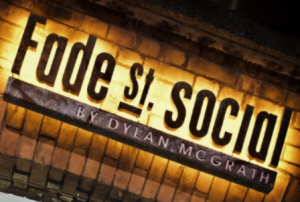 Dublin is a city at a crossroads. With one foot steeped in a rich and storied heritage and the other on the contemporary cutting edge, the signs are everywhere: architecture that seamlessly blends past, present and future and art and culture that both pays homage to history and aims to rise from its ashes. It is a place and a people that aches to hold onto its identity and yet embraces the politics and economy of globalization.
Dublin is a city at a crossroads. With one foot steeped in a rich and storied heritage and the other on the contemporary cutting edge, the signs are everywhere: architecture that seamlessly blends past, present and future and art and culture that both pays homage to history and aims to rise from its ashes. It is a place and a people that aches to hold onto its identity and yet embraces the politics and economy of globalization.
Perhaps nowhere is this mingling of new and old better displayed than at Fade Street Social Restaurant, an open-concept, multi-level eatery in Dublin’s famed Temple Bar district where celebrity chef Dylan McGrath’s latest venture offers the complete Irish dining experience; a mouthwatering mélange of traditional fare with a modern twist.
Starting with a half-dozen Oysters in the Shell (€11.95), a tasty tone was set for the soiree; bathed in chilled, cured salmon cream, cucumber, lemon shallot dressing and seaweed, the salty serving was succulent, savoury and simply scrumptious.
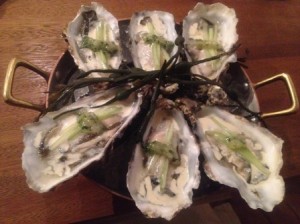
Next up was the wood-fired Flatbread (€9); a fresh feast of fried chorizo, chorizo oil, tomato sauce, tomato petals, onion lyonnaise, pesto, rosemary, black olives, red pepper slices, red pepper hummus, baby squid, baby mozzarella, baba ghanoush, smoked paprika, torn basil and coriander that both teased and pleased the palate.
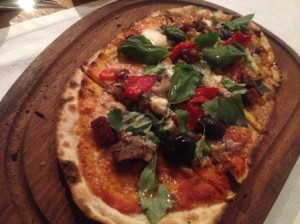
Similarly, the tender tastes and textures of in-house appetizers Colcannon (€4.75 – creamy mashed potatoes with creamed kale) and Celeriac Cabbage and Apple (€7 -celeriac purée with sticky glazed cabbage, apple purée topped with potato mousse) were equally light and gentle on the belly.
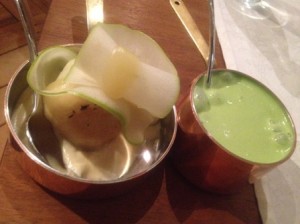
The real treat this night, however, was to follow with the Braised Lamb Stew (€16.5). An updated take on a classic Irish dish, the perfectly proportioned platter was smothered with spiced cream drops of potato mousse and crispy balsamic fillet, scented with lovage and celery leaves and served with crusty bread and hazelnut butter. Subtly seasoned and sautéed, the satisfying entrée exemplified all that is delicious and delectable about Dublin’s transition from yesteryear.
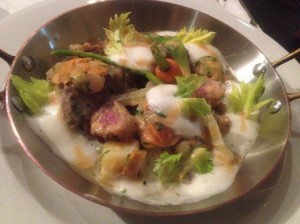
The selections would not have been complete without proper offerings from both the fully-stocked bar and the fine wine list. A cache of creative cocktails included the Slippery Sloe (€10.20 -a mixture of Sipsmiths sloe gin with a quinine-based aperitif, flavoured with fresh citrus oils and almond) and Murphy’s Measure (€12.95 – Becherovka and French aperitif Lillet Blanc, combined in equal parts and shaken hard over ice with a large measure of Chopin Potato Vodka and two dashes of aromatic bitters).
The recommended vins du soir did well to complement the meal also; both the Pieve de Pitti Cerretello, Chianti Superiore, 2008 (€44 – Tuscany, Italy) and the Marble Leaf Sauvignon Blanc, 2011 (€39 – Marlborough, New Zealand) were well-balanced, bringing out the best in the banquet.
The Banoffi (€7.5) – a not-too-sweet sampling of banana purée and sorbet, caramelized condensed milk, vanilla crème fraiche, caramel jelly and foam, and sided with digestive biscuits and crisps – was an ideal companion for a rich dessert of time-honored Irish coffee, bringing the culinary quest to a close.
Suffice to say that service was superior and sincere, with Aoife (“it’s pronounced EE-FA here”) checking in every quarter hour to ensure that both my plate and glass were topped-up. Likewise, several of the staff and kitchen crew could be seen chatting-up the diverse clientele – the world-renowned Irish hospitality on exhibit, and in keeping with the welcoming locale and décor.
Credit Chef McGrath for his efforts to redefine, and refine, the modern Irish menu; much like Dublin itself, his pairing of past and present leaves a lasting, lingering impression. Reservations are recommended.
Fade Street Social
Fade Street, Dublin 2, Ireland
www.fadestreetsocial.com



















Leave a Comment